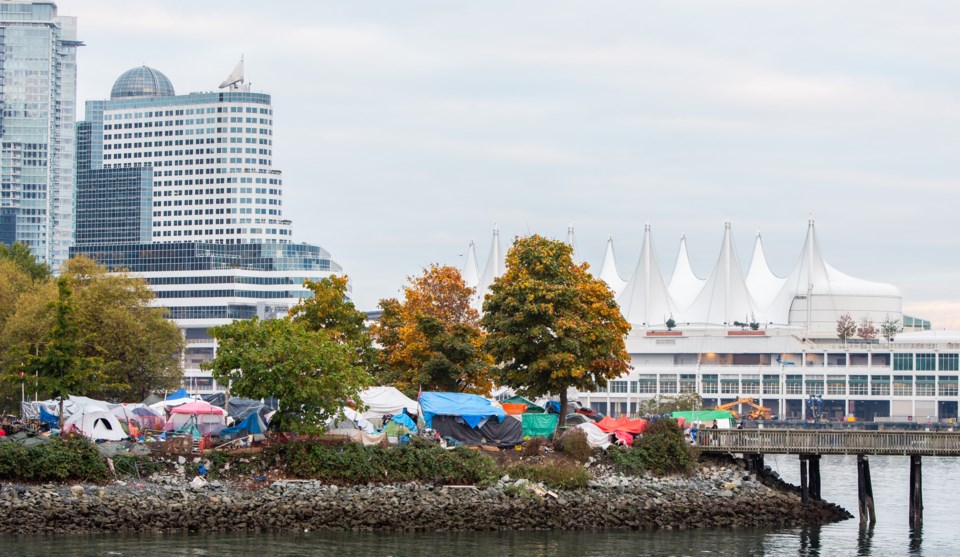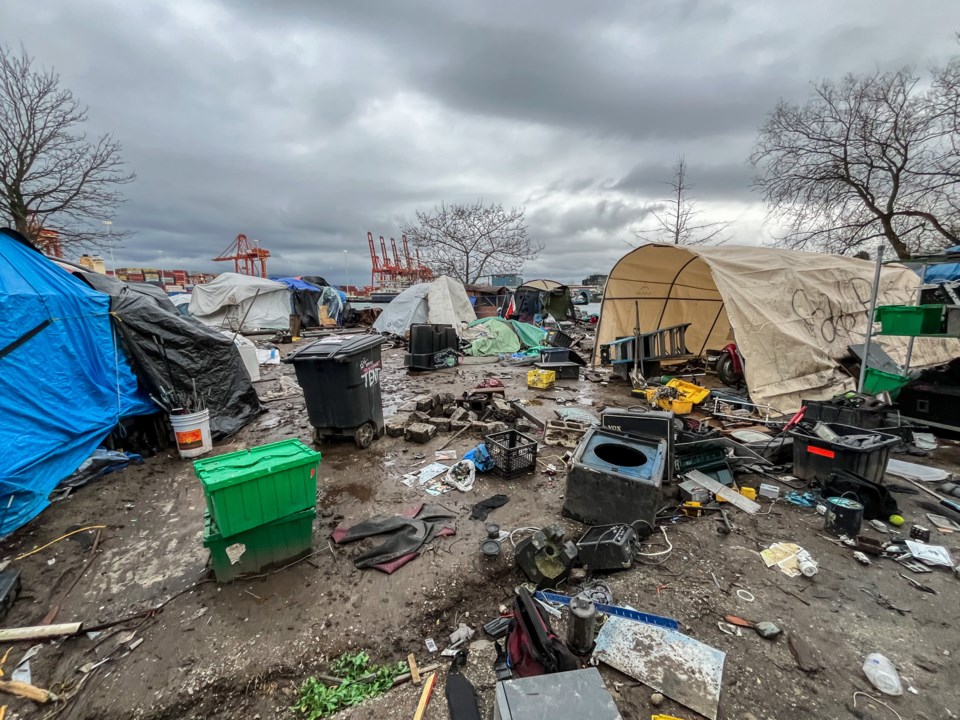The City of Vancouver unveiled a plan Tuesday to clean up a section of the CRAB park homeless camp that officials say is focused on removing debris and hazardous materials from the waterfront piece of land.
The plan, which involves the use of a backhoe, front-end loader and garbage trucks, will roll out over the next three weeks and include a temporary sheltering area on the peninsula for camp residents affected by the work.
Police will be on site to keep the peace.
“This is not a decampment, this is an attempt to clean up this area and ensure that the area is bylaw compliant for safety and health reasons moving forward,” said Sandra Singh, a deputy city manager, at a briefing Tuesday.
Singh said the city’s homelessness services group along with BC Housing continue to engage with camp residents to find shelter or housing for the estimated 52 people recorded living on and off in the park.
She said the city wants to complete the work as soon as possible.
“We recognize that uncertainty creates stress for people and that no matter how we approach this work, it will create stress for folks that are sheltering in the encampment, and we want to do our best to mitigate that,” Singh said.

Rat infestation
Crews will focus on the “daytime area” of the camp, which was allowed by a park board general manager’s order in April 2022 for residents physically unable to take down their structures each morning.
That order stipulated that people cannot move items such as motorcycles, generators, wood, pallets, propane tanks or building materials into the area. Recent photographs taken by city officials and shown at Tuesday’s briefing showed considerable debris in the space.
City and park board staff say they initially looked at a more phased approach to provide a safer, cleaner designated area for residents but concluded the debris could not be moved by hand tools.
Staff also assessed the conditions as “too unhygienic and with too many risks to staff and the people sheltering in the designated area to continue to do the work in this way,” according to documents provided at the briefing.
“Of note, on Jan. 25, large amounts of debris, garbage, propane tanks, hazardous and unhygienic materials like needles and feces, a rat infestation and soiled materials were observed,” Steve Jackson, general manager of the park board, told reporters.
'Chop shops'
Bicycle “chop shops,” motorcycles, scooters, batteries, propane tanks, buried construction conduit and construction scaffolding were also identified by park rangers and other city crews during visits to the park.
Officials estimated the camp’s population at 52 people on Feb. 14, with 30 people sleeping in the park at least three nights a week. All are on a priority list with BC Housing. Another 22 people with no fixed address have been seen at some point in the camp since November 2023.
The encampment was established in May 2021.
The timeline provided by officials for the plan shows March 18 as the day the temporary sheltering area will be set up for camp residents. Fencing will be erected around the area of concern March 25 before cleanup begins, with a target finishing date of March 31.
The number of structures recorded in December was 80, with 20 considered non-compliant. The park control bylaw and general manager’s order states that only one tent per person is allowed in a three-metre by three-metre area.
Human rights complaint
The reaction to the plan from advocates for people living in the park focused on an ongoing human rights complaint before the BC Human Rights Tribunal that camp residents lodged against the city and park board.
The complaint alleges the city and park board “discriminated in services… based on Indigenous identity, race, colour, ancestry, place of origin, physical and mental disability, sex and age.”
“There is an active human rights complaint currently underway, which documents bad faith communication as one of the service areas in the complaint,” the release said. “That complaint must be resolved before engaging in any other so-called consultation, eviction and move of the three-year old tent city.”
Asked by reporters about the complaint, Singh said: “That complaint is specifically about access to washrooms, access to showers, access to electricity and access to shade. But this is a different process. This is about cleanup of debris and cleanliness in the area.”
Camp resident
Larry, a resident of the park, said by telephone Tuesday that he thinks the area could use some cleanup but was concerned that people's personal belongings might be lost when city crews bring in their heavy machinery.
“[My neighbours] just want reassurance that they're not going to come and bulldoze all their stuff and take all their possessions away,” said Larry, who was on his way back to the park when reached by Glacier Media.
He acknowledged city officials have been in touch with residents about the cleanup plan but noted discussions could be intimidating.
“The residents don't really want to talk to them when they come in with like 15 cops behind them,” he said. “It's not really something that we enjoy. When we deal with them, there’s not 30 of us coming to talk to one of them.”
City officials said residents displaced from the daytime area will be provided storage for their belongings, along with “relocation support, food and water, mental health supports and cultural supports,” according to Singh.





